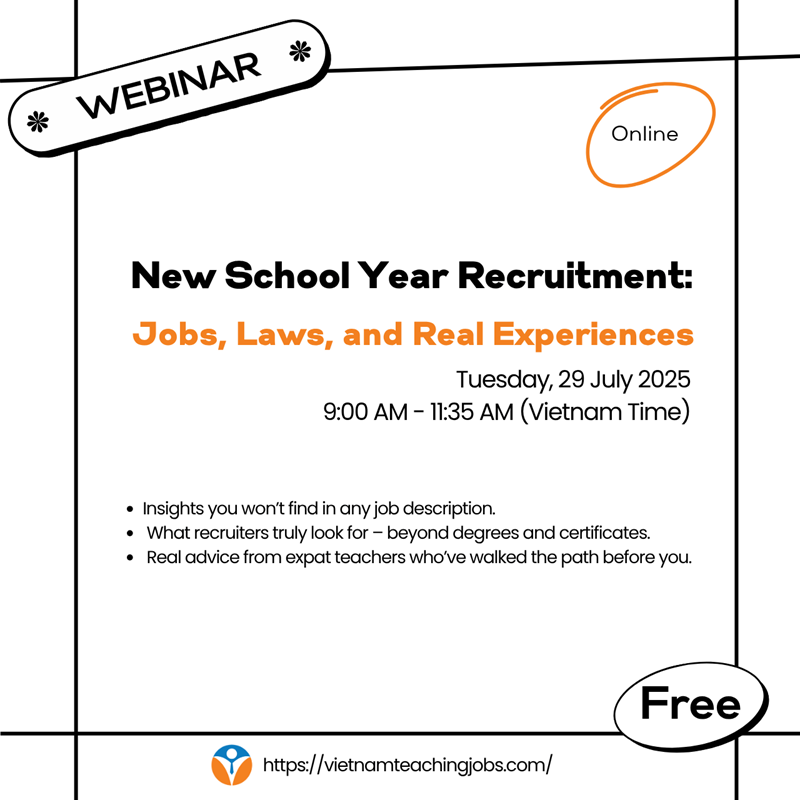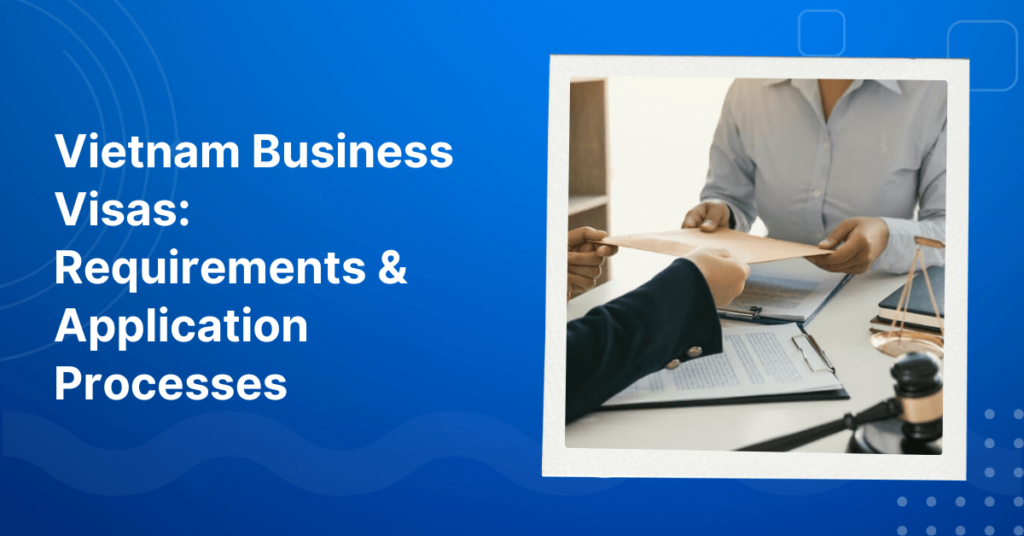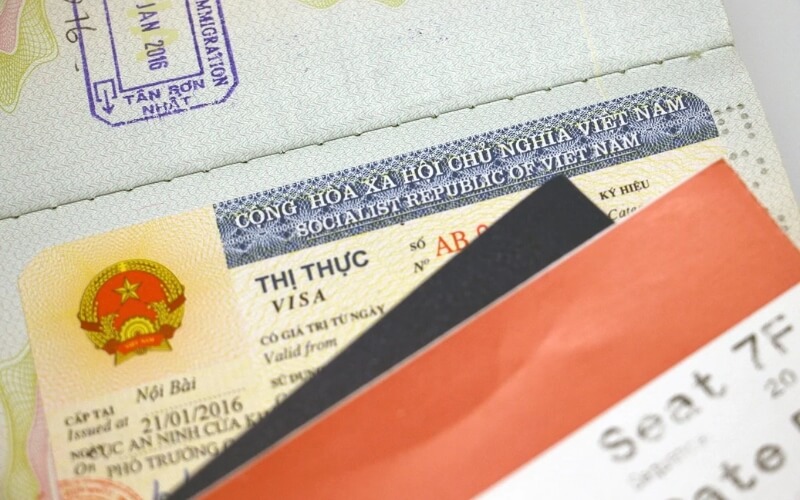


Navigating Vietnam’s business landscape starts with obtaining the right visa. The Vietnam Business Visa opens doors for international professionals, allowing attendance at meetings, conferences, and exploration of lucrative opportunities. Discover the essential types, requirements, and application processes for this crucial entry permit.

A Vietnam business visa is specifically for individuals who want to enter Vietnam for business-related purposes—whether it’s attending meetings, signing contracts, or exploring new business opportunities. Unlike a tourist visa, which is for those visiting Vietnam for leisure or sightseeing, the business visa allows you to engage in official, professional activities. Essentially, if your trip involves anything work-related but you’re not planning to take up full-time employment, this is the visa you’ll need.
There are two main types of business visa for Vietnam, categorized based on the purpose of the visit.
Visa DN1: This visa is for those who are working with legal entities or companies that are registered under Vietnamese law. If you’re partnering with a company based in Vietnam or have some kind of professional collaboration with them, this is the visa you’ll likely apply for.
Visa DN2: This type of visa is for those who are invited by foreign organizations operating in Vietnam. If you’re part of an international company or organization that’s doing business in Vietnam, this is the one you’ll need.
Each business visa type is assigned a specific symbol, either DN1 or DN2, and comes with a certain validity period. Depending on the visa you get, it can be valid for anywhere from one month to three months, and it can be issued for either single-entry or multiple entries.
So, depending on how long you plan to stay and whether or not you need to travel in and out of Vietnam, you’ll choose between these options.
Discover Related Guides: Vietnam Work Visa: Requirements & Process

If you’re planning to visit Vietnam for business purposes-like attending meetings, conferences, or even exploring potential business opportunities-you can apply for a business visa. This type of visa is available to foreign nationals who are invited by a company or organization based in Vietnam.
Whether you’re working with a local Vietnamese business or representing a foreign organization with operations in Vietnam, you’re eligible to apply. The key is that your visit needs to involve some professional activity.
However, to apply for a Vietnam business visa (DN visa), foreign nationals must meet all of the following conditions:
To apply for a Vietnam business visa, there are two main sets of documents you’ll need: one from you (the applicant) and one from the inviting or sponsoring company.
Documents for the Applicant:
Documents for the Sponsoring or Inviting Company:
Discover Related Guides: Vietnam Work Permits Guide 2025: Legal Requirements & Process
The good news is that not everyone needs a business visa to enter Vietnam! Depending on your nationality, you might be eligible for a visa exemption, which means you can visit Vietnam for a limited time without needing a visa. However, this is only for short visits and may not apply if you’re staying for an extended business trip.
Some foreign nationals are exempt from Vietnam business/work visa. Specifically:
| Nationals | Time (day) |
| Belarus | up to 15 days |
| Brunei | up to 14 days |
| Cambodia | up to 30 days |
| Chile | up to 90 days) |
| Denmark | up to 15 days |
| Finland | up to 15 days |
| France | up to 15 days |
| Germany | up to 15 days |
| Indonesia | up to 30 days |
| Italy | up to 15 days |
| Japan | up to 15 days |
| Kyrgyzstan | up to 15 days |
| Laos | up to 30 days |
| Malaysia | up to 30 days |
| Myanmar | up to 14 days |
| Norway | up to 15 days |
| Philippines | up to 21 days |
| Panama | up to 90 days |
| Russia | up to 15 days |
| Singapore | up to 30 days |
| South | up to 15 days |
| Spain | up to 15 days |
| Sweden | up to 15 days |
| Thailand | up to 30 days |
| United Kingdom | up to 15 days |

To apply for a Vietnam business visa this way, the foreign applicant will need to visit the office of the Vietnamese Embassy or Consulate to get the visa stamp. The process for obtaining this type of business visa is as follows:
Step 1: Apply for an Entry Approval Letter: The sponsoring company in Vietnam will prepare the following documents and submit them to the Vietnam Immigration Department to request an entry approval letter:
If the entry approval application is approved, the Immigration Department will:
Step 2: Prepare the Documents for the Visa Stamp: The sponsoring company will send the entry approval letter to the foreigner. The foreigner will then print this letter and prepare the following documents to apply for the visa stamp:
Step 3: Obtain the Visa Stamp: The foreigner will submit the required documents in person or send them by mail to the registered Embassy/Consulate, depending on their policies. Once the visa is granted, the visa stamp will be affixed to the foreigner’s passport, allowing them to enter Vietnam and work at the sponsoring company.
Discover Related Guides: Vietnam Temporary Residence Card (TRC): Essential Guide
The process for applying for a business visa at the airport is quite similar to the procedure for obtaining a visa at the Embassy. However, instead of getting the visa stamp at the Embassy, the foreigner will receive the stamp upon entering Vietnam for work or business. The procedure for this airport visa includes three steps:
Step 1: Request an Entry Approval Letter: The sponsoring company in Vietnam will submit an application for the entry approval letter to the Vietnam Immigration Department and send the result as a PDF file to the foreigner preparing to enter the country.
Step 2: Prepare Documents for the Visa Stamp:
The foreigner will need to prepare the following:
Step 3: Obtain the Visa Stamp at the Airport: Upon arriving at a Vietnamese airport, the foreigner will go to the visa counter and present the required documents to the Immigration Officer. After paying the stamping fee, the visa (DN1/DN2) will be affixed to the passport, completing the entry process into Vietnam.
With this visa type, foreigners cannot convert it into a temporary residence card. Therefore, if someone wants to work long-term in Vietnam, it is advisable to apply for a work permit and a temporary residence card, as the e-business visa is not a recommended option. Foreigners can apply for the e-business visa themselves or have a sponsoring company assist them.
Additionally, the sponsoring company can also apply for the visa on behalf of the foreigner for entry into Vietnam. The specific steps are as follows:
► If the Foreigner Applies for the E-Business Visa Independently:
► If the Inviting/Sponsoring Entity Applies for the E-Business Visa on Behalf of the Guest:

This visa allows you to enter Vietnam once and stay for up to 30 days. After you leave, you would need to apply for a new visa if you want to return. It’s a great option if you’re planning a short-term business trip without needing to exit and re-enter the country.
With the one-month multiple-entry visa, you can come and go from Vietnam as many times as you need within the 30-day period. It’s ideal if your business activities require you to travel in and out of the country frequently during that month.
If your business in Vietnam requires a longer stay, the three-month single-entry visa gives you up to 90 days in the country. However, like the one-month single-entry visa, once you leave, the visa becomes invalid, and you’ll need a new one to re-enter.
This visa is the most flexible, allowing multiple entries into Vietnam for a period of 90 days. It’s perfect for business professionals who need to enter and exit Vietnam multiple times over the course of three months.
In addition to the process for obtaining a business visa for foreigners in Vietnam, Vietnamese immigration law also allows for the extension of business visa for foreigners already in the country. If you want to extend your business visa, here are the steps to follow:
Step 1: Prepare the required documents for the visa extension:
Step 2: Submit the visa extension application for the foreigner to the Immigration Department or the Provincial Immigration Office.
Step 3: Pay the visa extension fee for the foreigner (10 USD).
Step 4: Wait for the results. The processing time for the visa extension application is no more than five working days from the date the authorities receive a valid extension application.
| Visa Application Method | Processing Time |
| 1. Applying at a Vietnamese Embassy or Consulate | Standard Processing: About 5-6 working days |
| 2. Applying Online (E-Visa) | Standard Processing: 2-3 working days |
| Urgent Processing: As little as 2-3 working days | |
| 3. Visa on Arrival | Approval Letter: 2-3 working days |
The cost of a Vietnam business visa depends on the application method. Specifically:
1. Fees for business visa issued at the airport include: Entry approval letter fee and Stamping fees:
2. E-visa business fee: Around 25 USD.
3. Fees for business visa issued at the Embassy/Consulate include:
While a business visa allows you to engage in certain work-related activities, it’s important to note that it does not grant you the right to work for a Vietnamese company in a traditional employment capacity. Essentially, a business visa is meant for individuals participating in business meetings, attending conferences, or conducting market research. If your goal is to take up a permanent position with a local company or engage in hands-on work, you’ll need to obtain a work permit, which requires a different set of procedures and documentation.
Moreover, business visa typically have a limited validity period. Depending on the type you obtain, it could be valid for 30 days to 90 days and may allow for single or multiple entries. Once your business visa expires, you must leave the country or apply for an extension in advance, as overstaying can result in fines or complications for future travel.
If you’re looking to work in Vietnam beyond the scope of a business visa, you’ll need to secure a work permit. To apply for a work permit, you typically need the following documents:
Explore More: Vietnam Police Check: What You Need to Know
A sponsorship letter is an official document provided by a Vietnamese company or organization, stating that they are inviting you to conduct business activities in Vietnam. This letter typically includes details such as the purpose of your visit, the duration of your stay, and the company’s contact information.
When Do You Need One? You need a sponsorship letter when applying for a business visa to Vietnam. It serves as proof that you have a legitimate reason for entering the country for business purposes. If you are attending meetings, conferences, or signing contracts, this letter is essential to support your visa application and ensure compliance with Vietnamese immigration regulations.
While a business visa allows you to engage in various business activities such as attending meetings and signing contracts, it does not permit you to work for a Vietnamese company or take up employment in Vietnam.
In general, obtaining a business visa without a sponsor is challenging and not recommended. The Vietnamese government typically requires a sponsorship letter from a Vietnamese company to approve your business visa application.
A business visa is designed for people who want to visit Vietnam for work-related activities. This could include attending meetings, conferences, or negotiating contracts with Vietnamese companies. Business visa usually allow for a longer stay, sometimes up to 90 days, and can be valid for multiple entries, meaning you can go in and out of the country several times during that period. To get a business visa, you often need a sponsorship letter from a Vietnamese company, which shows that you have a legitimate reason to be in the country for business.
On the other hand, a tourist visa is for those who want to travel to Vietnam for leisure and sightseeing. This type of visa is typically shorter, lasting up to 30 days, and is often issued for a single entry or sometimes multiple entries. The requirements for a tourist visa are usually simpler; you generally don’t need a sponsorship letter, just basic travel documents and payment for the visa fee.
In conclusion, the Vietnam Business Visa is an important tool for anyone looking to engage in business activities in Vietnam. Whether you are attending meetings or exploring new markets, having the right visa will help you make the most of your time in this beautiful country. Remember to check the requirements and plan ahead, so you can focus on building your business connections in Vietnam!
Can I apply visa online or I really need to go to Embassy? It’s my first time. I am direct hire. Please help me.
Dear Jenelyn,
Currently, DN1 Business visas are processed through the government’s public service portal (usually with employer or agency support), while teachers can apply for e-visas online. However, Filipino teachers currently in the Philippines need to complete the OEC (Overseas Employment Certificate) procedure after submitting their visa application. For detailed consultation, please contact via Zalo/WhatsApp: +84913525225.
Regard.